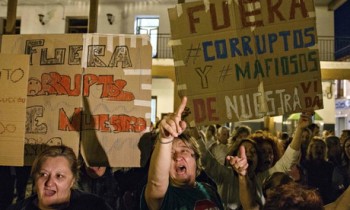 A day after PM Mariano Rajoy played down scale of corruption in Spain, members of his party were among those arrested
A day after PM Mariano Rajoy played down scale of corruption in Spain, members of his party were among those arrested
Dozens of public officials, bureaucrats and business leaders have been arrested across Spain as part of a wide-ranging corruption investigation, just a day after the prime minister, Mariano Rajoy, downplayed the scale of graft in the country.
Speaking on Sunday, Rajoy sought to depict the issue as a case of a few bad apples and one that must not define Spain. Noting that the justice system was doing its job, he said, “a few small incidents isn’t the same thing as 46 million people nor all of Spain”.
Less than 24 hours later, 51 people – including top members of Rajoy’s ruling People’s party (PP) – were arrested as part of an investigation into “a network of corruption” that involved contracts worth roughly €250m (£197m), the country’s anti-corruption prosecutor’s office said on Monday.
The investigation focused on the regions of Madrid, Murcia, León and Valencia, the prosecutor’s statement said. “The collusion between local councillors and civil servants, with builders and energy service companies, and the corruption of middle-men and key companies, has helped them to secure contracts worth around €250m in the past two years alone.”
Those arrested include Francisco Granados, a former high-ranking PP official in the Madrid region who stepped down in February after it emerged he had at least €1.5m in a Swiss bank account. As many as six mayors from the Madrid region were also reportedly among those arrested.
They face charges including money laundering, embezzlement and influence peddling.
On Monday the PP sought to take a tougher line on corruption than Rajoy did on Sunday. “The PP is indignant and rejects any type of corruption,” said a spokesman. Any members involved in the arrests would be immediately suspended from the party, he added.
The Socialist party also said it would expel any of its members arrested on Monday.
The raid is the latest in a series of scandals that have entangled Spanish politicians and bankers. An investigation into the misuse of company credit cards by more than 80 officials connected to savings bank Caja Madrid has dominated headlines in recent weeks.
The officials allegedly racked up charges on the cards of more than €15m on everything from groceries to safaris. The bill for Rodrigo Rato, a former head of the International Monetary Fund and a former PP finance minister, came to more than €54,800. That of chief executive Miguel Blesa came to €436,700, including €10,000 spent on wine and more than €1,500 at ice cream shops.
The lavish spending continued for many of them in 2010, when Caja Madrid folded into Bankia. Two years later, facing near-collapse, Bankia became the symbol of the country’s financial crisis and forced Spain to seek an EU bailout.
Corruption scandals have left few among the Spanish ruling class untainted, engulfing politicians on the left and right of the spectrum, as well as businesses, unions, football clubs and even the king’s sister.
As corruption consistently ranks as a top concern for Spaniards, second only to unemployment, and with an eye on upcoming municipal and regional elections in the spring, Spain’s political parties have been keen to appear as if they are tackling the issue. The rising popularity of Podemos, an anti-austerity party that promises to rid Spain of corruption, has also been credited with sparking a shift in the political attitude towards corruption.

